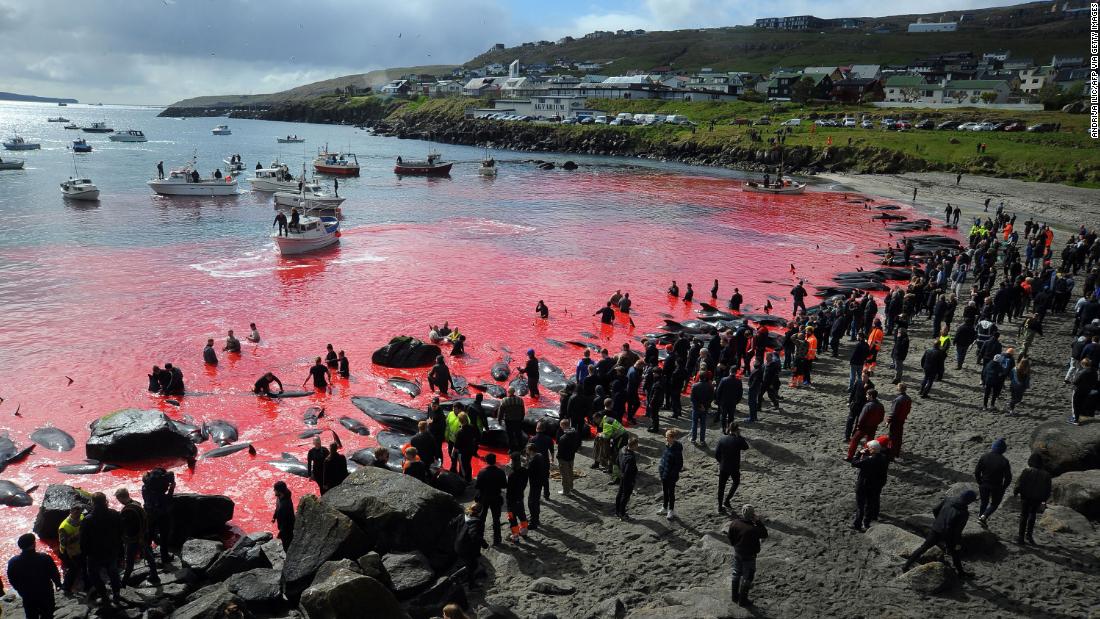
Situated halfway between Iceland and Scotland in the Atlantic Ocean, the Faroes are a self-governing territory of the Kingdom of Denmark made up of 18 islands.
Animal rights organizations have historically condemned the cull, in which whales are killed by gashes to the neck and subsequent cuts to the spinal cord and carotid artery.
“The meat from each whale drive provides a large amount of valuable food, which is distributed free in the local communities where the whale drives take place… the meat of the 1,400 dolphins caught on Sunday has likewise been distributed among the participants in the catch and the local community,” Faroese government spokesman Páll Nolsøe told CNN after the hunt last year.
The government’s decision follows last year’s hunt, when a super-pod of 1,428 Atlantic white-sided dolphins were corralled by jet skis and speed boats onto Skálabotnur beach on the island of Eysturoy and eventually killed, according to marine conservation group Sea Shepherd.
At the time, the group denounced the killing as a “brutal and badly mishandled” massacre, and the largest single hunt in the territory’s history.
In a statement announcing its decision Sunday, the government said of the September 2021 hunt: “It has been acknowledged that aspects of that catch were not satisfactory, in particular the unusually large number of dolphins killed.”
“This made procedures difficult to manage and is unlikely to be a sustainable level of catch on a long-term annual basis,” the government added.
Lukas Erichsen, a representative of Sea Shepherd, described the new quota as “totally meaningless.”
Erichsen, who is part of Sea Shepherd’s whale defense campaign in the Faroe Islands, told CNN in an emailed statement that there appeared to be no penalty for exceeding the quota. “Indeed who would be prosecuted or fined should over 500 be killed in the next two years? No doubt if over 500 were killed in a year then those responsible would claim they did not realize that the pod was so big until it was driven into the shallows and the dolphins killed,” he said.
“This new ‘quota’ is meaningless for dolphins in the long run and has only hastily been announced as a thinly-veiled attempt to deceive both politicians and the press in the face of continued outrage over the killing of dolphins in the Faroe Islands,” Erichsen added.
The government said in its latest statement that it aligns itself with the UN Sustainable Development Goals, a set of 17 commitments that address global challenges, including the climate crisis and the need to preserve and sustainably use the oceans, seas and marine resources.
“Catches of small whales are an important supplement to the livelihoods of Faroe Islanders, who have for centuries relied on the sustainable use of marine resources for their economy and local food security,” it said.
“The meat and blubber from each whale drive provide valuable food with a low carbon footprint, which is distributed for free in the different communities where the catches take place,” the government added.
There are about 80,000 white-sided dolphins in the seas surrounding the Faroe Islands, according to the government. It added that a yearly cull of just over 820 white-sided dolphins would therefore be “well within sustainable limits.”
However, it said it has asked the North Atlantic Marine Mammal Commission to provide more up-to-date information on how to sustainably catch white-sided dolphins, after which it will assess the provisional annual limit of 500.
The government also said it would review the method used to kill the dolphins to reduce the length of time it takes for them to die.
After last year’s killing, several whaling supporters condemned the hunt. Among them was Kristian Petersen, who told CNN at the time that “there were so many errors,” including stalking a big flock and prolonging the dolphins’ suffering by having too few people on the beaches to kill them.
CNN’s Jeevan Ravindran, Stephanie Halasz, Allegra Goodwin and Sharon Braithwaite contributed reporting to this story.
